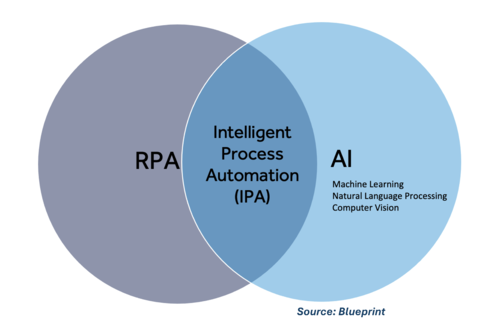Intelligent Process Automation (IPA)
What is Intelligent Process Automation (IPA)?
Intelligent Process Automation (IPA) combines robotic process automation (RPA) with artificial intelligence (AI) technologies to create automated processes that go beyond routine tasks. IPA integrates machine learning (ML), natural language processing (NLP), and other advanced analytics capabilities to handle higher-order tasks that require judgment and decision-making skills, which traditionally require human intervention.
Role and Purpose of IPA
The role of IPA is to enhance business process efficiency by automating complex tasks that involve data interpretation, decision-making, and learning from previous actions. Its purpose is to: Automate complex processes: Go beyond simple, rule-based tasks to automate complicated workflows. Increase efficiency and accuracy: Reduce errors and increase the speed of business processes. Improve decision-making: Use AI to provide insights and improve the quality of decisions made during automated processes.
Usage of IPA
IPA is used in a variety of ways: Customer Service: Automating responses to customer inquiries and providing customer support through chatbots that understand and process natural language. Financial Services: Automating credit scoring and fraud detection processes that require analysis of large datasets to identify patterns. Healthcare: Automating patient data processing and analysis for better diagnosis support, treatment suggestions, and patient management. Supply Chain Management: Automating inventory and demand forecasting requires analyzing trends from complex data inputs.
Importance of IPA
IPA is important because it allows organizations to leverage the benefits of both AI and automation technologies, leading to: Enhanced Productivity: Automating complex tasks allows human employees to focus on higher-value activities. Greater Scalability: Organizations can scale operations without proportionally increasing human labor costs. Enhanced Agility: Faster and more efficient processes allow organizations to respond more swiftly to market changes and customer needs.
Benefits of IPA
The benefits of implementing IPA include: Cost Reduction: Reduces operational costs by automating tasks that previously required manual labor. Improved Customer Experience: Faster and more accurate processing improves service delivery and customer satisfaction. Risk Reduction: Minimizes the risk of human error and increases compliance through consistent execution of tasks. Innovative Capabilities: Integrating AI technologies opens up new capabilities, such as predicting outcomes and making autonomous decisions.
Examples of IPA
Banking Sector: Banks use IPA to automate loan processing, from initial application review to final decision, involving complex criteria and regulatory compliance checks. Retail: Retailers implement IPA for personalized marketing, analyzing customer behavior data to tailor real-time offers and recommendations. Manufacturing: Automating quality control processes, where IPA systems analyze images from the production line to identify defects or inconsistencies. Overall, Intelligent Process Automation represents a significant advancement in how organizations can manage and optimize their workflows, combining the efficiency of RPA with the intelligence of AI to tackle more complex, varied, and nuanced tasks.
See Also
- Robotic Process Automation (RPA): Detailing the technology that underpins IPA, which involves automating routine tasks using software robots.
- Artificial Intelligence (AI): Explaining the AI components that distinguish IPA from simpler automation tools, including machine learning, natural language processing, and decision-making capabilities.
- Machine Learning: Discussing the subset of AI that enables systems to learn from data patterns and improve over time, which is often integral to IPA solutions.
- Business Process Management (BPM): Covering the broader field of managing and optimizing business processes, of which IPA is a tool for enhancing automation and efficiency.
- Data Analytics: Explaining how IPA leverages data analytics to improve decision-making processes and outcomes in automated tasks.
- Workflow Automation: Discussing tools and strategies for automating complex business workflows, which IPA often targets.
- Digital Transformation (DX): Detailing how organizations modernize their IT infrastructure and business processes through digital technology, with IPA being a key component of many transformation strategies.
- Cloud Computing: Explaining how cloud-based services and platforms support IPA by providing scalable resources and advanced computing capabilities.
- Internet of Things (IoT): Discussing how IPA can be integrated with IoT to automate processes and decisions based on real-time data from connected devices.

